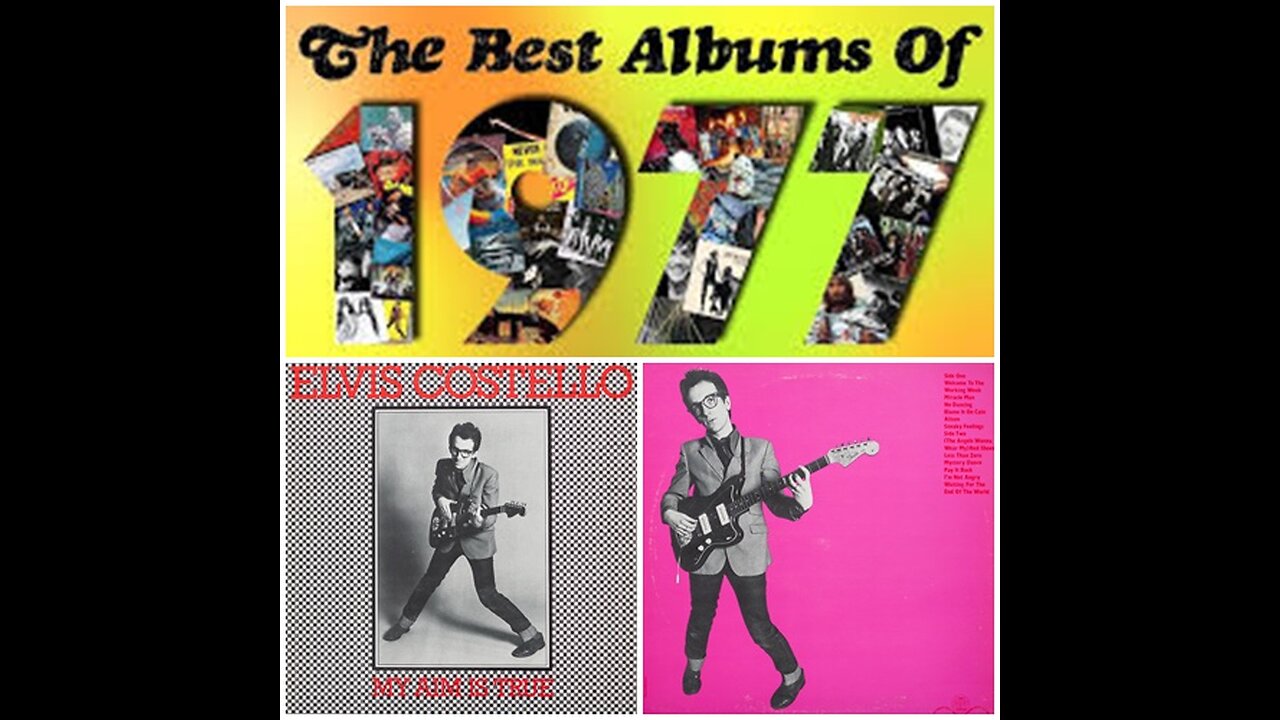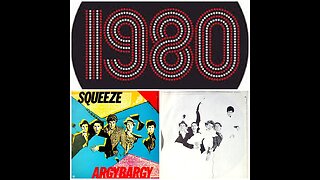Premium Only Content

My Top 20 albums from 1977 No 2
MY AIM IS TRUE
Year Of Release: 1977
Track listing: 1) Welcome To The Working Week; 2) Miracle Man; 3) No Dancing; 4) Blame It On Cain; 5) Alison; 6) Sneaky Feelings; 7) (The Angels Wanna Wear My) Red Shoes; 8) Less Than Zero; 9) Mystery Dance; 10) Pay It Back; 11) I'm Not Angry; 12) Waiting For The End Of The World; 13) Watching The Detectives; [BONUS TRACKS:] 14) Radio Sweetheart; 15) Stranger In The House; 16) Imagination (Is A Powerful Deceiver); 17) Mystery Dance; 18) Cheap Reward; 19) Jump Up; 20) Wave A White Flag; 21) Blame It On Cain; 22) Poison Moon.
Since it is by now a well-known fact that Costello's first album had been lumped in with the whole "punk" schenanigan just because it happened to come out in 1977 (and it could have come out at just about any time, except that, of course, in 1977 the record companies were more benevolent towards such stuff than, say, in 1973), I won't prattle too much about the cultural background of the epoch and stuff. Instead, let me just tell you this is one excellent album - although it takes a little time for it to sink in, well, just like about everything from Mr Resuscitated Buddy Holly.
Elvis was just a plain simple working man, programming in some retarded firm under his original McManus name, and quietly composing short, simple tunes to put under his pillow - like you and me, I guess, like the plain simple working man is supposed to. The big difference is that he got to actually fulfill his dream and release some of these songs on an actual LP. Of course, he hadn't yet had a chance to assemble a stable backing band, and for My Aim Is True he is joined by the American band Clover which I don't know that much about; seems like a pretty ordinary rockabilly band to me. Actually, Elvis' first attempts at recording (in particular, his demos and early outtakes, included on the CD re-release as bonus tracks) veered closer to country and Randy Newman than rockabilly; but the resulting product turned out to be somewhat more rocking, and thus, with stark, minimalist arrangements and an obvious neglection towards "complex", it's no wonder Mr Costello got branded as a "punk" by those who were thus branding everything new that the year 1977 had produced.
So how are these songs? Simple, yes, simple and obviously derivative, yet not so simple. Rockabilly, Buddy Holly and proto-pop are obviously the direct influences for My Aim Is True, but there are two things one should always keep in mind. One: the lyrics - mature, always interesting, intelligent and far more meaningful and poetic than, say, Bruce Springsteen's ramblings. And if "updating" Buddy Holly for the Seventies with classy lyrics is not enough for you, then there's the second factor: good melodies. Most of this stuff is not just catchy, like any solid Buddy Holly-penned song would be; it's catchy in its own special way, with certain unstandard chord changes, unexpectable twists and codas and melodies that even sometimes border on dissonant - of course, it's a big question if this is a testimony to Elvis' genius or his unprofessionality at the time, but that's up to the serious fan to think about. Of course, there are a couple of exceptions - like 'Mystery Dance', the fastest track on the album, which is just a mindless clone of just about any Fifties' rocker imaginable (except for the lyrics, of course) - but in general, listening to this record gives me a clear indication of one fact: this record, even with a simplification of the lyrics, could not have come out in the Fifties. And "blame it on Cain, don't blame it on me", but it's pretty obvious that the level of songwriting displayed herein seriously superates any true "punk" record made in 1977, yes, even including The Clash. Elvis just doesn't get to mask any of his supposed "weaknesses" with the wall of anger, distortion, loudness and plain noise that the punks so often abused. Here, if the song is good, it's obviously good; if the song is bad (which is rare), it is just as obviously bad. Really hard to deceive oneself.
The 'simpler' songs on My Aim Is True just chug along, producing a good effect nevertheless. Out of these, 'Miracle Man' and 'Blame It On Cain' are my favourites; nothing particularly outstanding here, but I just like to think of them as nice Fifties' tributes with a very personal feel - the first one deals with the problems of relationships between, you know, 'Her and Me' (Elvis' take on 'It Ain't Me Babe', I guess), while the second one carries a deep philosophical message of "we need somebody to burn", which is really as deep as Elvis' life philosophy goes, but that's not too shallow either. And Elvis' lonely ballad on the album, 'Alison', is pretty heartfelt, although the ending sure seems extended to me (actually, this is a general problem of the record - most of the songs are so short that Elvis and Clover for some strange reason thought they had to pan 'em out with extended codas, sometimes longer than the songs themselves!).
But, of course, it's the "less trivial" stuff that ultimately serves as a rating-defining factor for the record. 'Welcome To The Working Week', for instance, a one and a half minute lament over the lack of soul in today's busy technological world, which takes the traditional boogie structure and turns it upside down while still preserving the catchiness and memorability (not to mention the "message" - what a perfect anthem for the 'man of office labour'! Sums up in one and a half minutes everything that Ray Davies wanted to tell over the course of an entire Soap Opera). Likewise with '(The Angels Wanna Wear My) Red Shoes'; likewise with the excellent two tracks that close out the record. Out of these, 'Waiting For The End Of The World' is my favourite, and strange enough, it might be the closest thing to something 'punky' on the album - speed it up, add some extra distortion, and voila. What a drive, what power, what a message. Groovy.
It is indeed an interesting thing that the album begins to "solidify" itself near the end - after the rockabilly sendup 'Pay It Back', we witness at least one richly arranged track, the thunderstormy 'I'm Not Angry' (punk? When he's naming his songs like that?), then 'Waiting For The End Of The World', then the reggae-influenced 'Watching The Detectives'. This intelligent 'record construction' actually works as a bonus - you start out with the 'lightweight' tunes and then, the more the record progresses, the more you get the feeling it's been penned by a really serious and talented artist. Thus, I'm quite content to give it an 11 despite all the 'tribute' factors; it is certainly far from Costello's peak (no matter what Rolling Stone tells you, acclaiming this as a peak for Elvis is akin to considering Please Please Me the Beatles' finest hour), but it's nevertheless a consistent, engaging record which you're bound to love if you can get over Elvis' lack of good singing voice - and you should.
-
 8:24
8:24
JohnVicarysMusicPassions
5 days agoMy Top 20 Albums from 1980 no 9
19 -
 1:22:11
1:22:11
Russell Brand
7 hours agoTrump in Gaza - a construction project? – SF533
95.7K86 -
 LIVE
LIVE
LFA TV
18 hours agoMAGA WRECKING BALL ON USAID | CULTURE WARS 2.6.25 2pm
1,280 watching -
 LIVE
LIVE
The Dana Show with Dana Loesch
2 hours agoTRUMP SIGNS EO PROTECTING WOMEN'S SPORTS | The Dana Show LIVE On Rumble!
614 watching -
 24:14
24:14
SLS - Street League Skateboarding
20 days agoTop Moments of Brazilian Skaters at the 2024 Super Crown: Rayssa Leal, Giovanni Vianna & more...
178 -
 59:24
59:24
The Dan Bongino Show
5 hours agoThey Fell Right Into Trump's Trap (Ep. 2417) - 02/06/2025
756K1.27K -
 47:26
47:26
The Rubin Report
4 hours agoBill Gates Makes ‘The View’ Crowd Go Quiet with This Chilling Warning
75.3K135 -
 DVR
DVR
CryptoWendyO
1 hour ago $0.41 earnedXRP RUMOR: RIPPLE HAS A SECRET DEAL WITH TRUMP?!
5.92K1 -
 2:02:40
2:02:40
Steven Crowder
5 hours agoHow USAID Spread Fake News with Your Tax Dollars & Trump Took Down Title IX
435K237 -
 DVR
DVR
TheAlecLaceShow
2 hours agoGuests: Alex Marlow, Rep. Cloud & Rep. Gill | No Men In Women’s Sports | The Alec Lace Show
13.9K